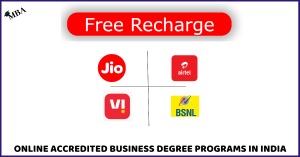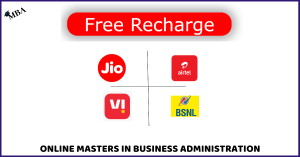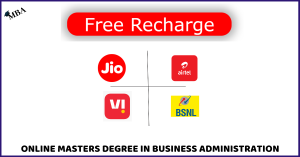If you’re looking to pursue an online MBA in India, the single most critical filter is: Is it UGC‑approved (or UGC‑DEB approved/entitled)? Because without that, your degree may face recognition issues, especially for jobs, higher studies, or government roles. In this blog, I’ll walk you through:
- What “UGC‑approved / UGC‑DEB / UGC‑entitled” means
- Why it matters
- Examples of universities offering UGC‑approved online MBAs
- How to check whether a program is truly legit
- Things to watch out for
Let’s jump in.
What Does “UGC‑Approved / UGC‑DEB / UGC‑Entitled” Mean?
Before we name names, we need to clarify some terminology and regulation, since many sources use different labels.
- UGC (University Grants Commission) is the statutory body in India that oversees universities and their standards.
- DEB (Distance Education Bureau) is a UGC arm which handles issues related to open, distance, and online education.
- In some cases, universities are “UGC‑entitled to offer online programs” — meaning UGC (through DEB) has granted permission or recognition for specific online or ODL (open and distance learning) programs.
- The list of universities and programs approved/entitled is periodically updated by UGC / DEB.
- A “UGC‑approved online MBA” means that the university and/or the specific online MBA program has been approved / recognized such that the degree you get is valid in India (for jobs, further studies, etc.).
Hence, when you see claims like “UGC approved online MBA”, you should confirm whether it means UGC recognition, DEB approval, or entitlement by UGC to offer online courses.
Why UGC Approval Matters (Don’t Skip This)
Here are a few concrete reasons why UGC / DEB recognition is vital:
- Legitimacy & Recognition
Universities with UGC / DEB approval are recognized by other institutions, employers, and regulatory bodies. Without this, your degree might be seen as less credible. - Government / PSU jobs & eligibility
For many government, banking, or PSU roles, degrees must come from recognized institutions. An unapproved degree can disqualify you. - Further Education / Higher Studies
If you plan for a PhD, or even a full-time MBA later, many institutions require that your prior degree is from a recognized institution. - Validation & legal protection
If a university claims to offer “online MBAs” but is not approved, there’s risk of degrees being invalidated, or being asked later to prove legitimacy. - Student protection & oversight
UGC / DEB regulations ensure minimum quality measures, such as standards for curriculum, faculty, delivery, and examinations.
Because of this, always treat UGC / DEB approval as a filter — you first shortlist only those programs that pass this test, then compare on curriculum, cost, flexibility, etc.
Examples of UGC / DEB / Entitled Online MBA Programs & Universities
Here are real universities in India known to offer online or “entitled” MBA / management programs with UGC / DEB recognition (or claims thereof). Always cross-check their current status.
| University / Platform | What They Offer / Special Mention | Notes / Proof / Caveats |
|---|---|---|
| Anna University (Online CDE) | Online MBA (Business Analytics), MBA (General Management) | These programs are UGC‑DEB approved / entitled and also recognized by AICTE. onlinecde.annauniv.edu |
| Amity University Online | Fully online MBA (various specializations) | Amity claims to be India’s first UGC‑approved online university for UG/PG. Amity Online |
| Manipal University / MAHE – Online | Online MBA for working professionals | Manipal launched “Online Manipal” with UGC-entitled online degree status. Wikipedia+1 |
| Symbiosis / SSODL | Online / digital MBA / related programs | Symbiosis has been mentioned as offering UGC‑approved online programs. Learning Routes+1 |
| IGNOU (Open / Distance / Online mix) | MBA (via distance / open / hybrid) | Often used as a benchmark in distance / open learning. Many sources list IGNOU among UGC-approved institutions for non‑traditional MBA. College Vidya+2Vocal+2 |
| ICFAI University (Online / Distance) | Online / distance MBA | Frequently listed among UGC‑approved online MBA providers. College Vidya+1 |
| Desh Bhagat University (DBU) Online | Online MBA | DBU claims their online MBA is UGC‑DEB approved. dbuonline.in |
| Amrita Online (Amrita Vishwa Vidyapeetham) | Online MBA, with specializations like Business Analytics, FinTech, ESG | Amrita offers online MBA programs and these are listed under its “UGC-entitled” online programs. Wikipedia |
| Parul University Online | Online MBA among other online/distance programs | Parul launched “Parul University Online” offering MBA in online / distance mode. Wikipedia |
These examples are not exhaustive, but illustrate a cross-section of universities you may explore.
How to Verify Whether an Online MBA Program Is Truly UGC‑Approved / Legit
Because many universities or third‐party marketers may make misleading claims, here’s a checklist you should always run through before committing:
- Check UGC / DEB’s official list or announcements
UGC / DEB sometimes publishes the list of universities entitled to offer online / distance education. (Though note: UGC has changed how they publish the “Category I HEIs offering ODL programs” listing. Distance Education Bureau) - Look for “UGC-entitled / UGC-DEB approval / UGC‑DEB recognition” in the official website
The university’s site should explicitly mention that their online MBA is UGC‑DEB approved / entitled. Prefer detailed pages about recognition, accreditation, regulatory compliance. - Check for conflicting news / controversies
Some institutes have faced bans when offering online or distance programs without proper approval. For example, NMIMS was barred by UGC for offering online courses without proper approval, though the ban was later lifted after compliance. Wikipedia
Always search for “UGC ban / UGC warning + [University name]” to see whether any issues exist. - Check accreditation & quality — NAAC, NIRF, etc.
Even if UGC approves, check whether the university has good accreditation (NAAC grade, NIRF ranking, etc.). That adds credibility. - Verify program‑specific details
Sometimes the university is approved, but not for every online program. Ensure the MBA program specifically is listed among the approved ones. - Ask for official documentation / certificate page
You may request the regulatory approval document (e.g., letter from UGC/DEB) or certificate, or check if it’s uploaded publicly. - Cross‑verify with alumni / students
Talk to students or alumni about whether their degree is accepted by employers, or whether they encountered issues. - Check government / regulatory changes
Sometimes rules change. For example, UGC recently banned online / distance modes for certain healthcare / allied subjects. While that doesn’t directly affect MBA, it shows regulations evolve; always check the latest circulars. The Times of India
Also, UGC recently approved 113 universities to offer online courses for 2025–26. The Times of India
By doing this due diligence, you reduce the risk that your degree may later turn out to be non‑recognized.
Common Pitfalls & Red Flags to Watch Out For
- Grand claims with no proof
If the university’s marketing page just says “UGC approved” but doesn’t show the certificate, link, or regulatory page, treat it skeptically. - No clarity on which programs are approved
Sometimes only certain courses are approved; others may not be. - Poor or missing faculty / curriculum information
If they don’t show who teaches, what the syllabus is, or how assessments are done, that’s a red flag. - No alumni or student feedback
A legit program should have reviews, placements, or at least a track record. - Aggressive sales / limited seats pressure
If they push you to sign up fast or claim “only 10 seats left” without a transparent process, be cautious. - No refund or exit clauses
Always check whether there’s a refund or exit clause if you later find the program is not acceptable.
Suggested Comparisons & What to Prioritize
Once you’ve filtered by UGC / DEB legitimacy, you can compare on these axes:
- Specializations offered (Analytics, Marketing, HR, Finance, etc.)
- Mode of delivery (asynchronous, live classes, hybrid)
- Assessment & evaluation style (proctored online, case projects, assignments)
- Career support & placement
- Cost & fee structure
- Student support, mentorship, peer interaction, alumni network
Don’t pick purely on cost. A slightly higher fee for credibility and better support is often worth it in the long run.
Final Thoughts / Call to Action
If you’re aiming for a credible, lasting degree, UGC approval (or UGC-DEB entitlement) is not optional — it’s foundational. Use the checklist above, cross‑verify details, and talk to actual students before you commit.




